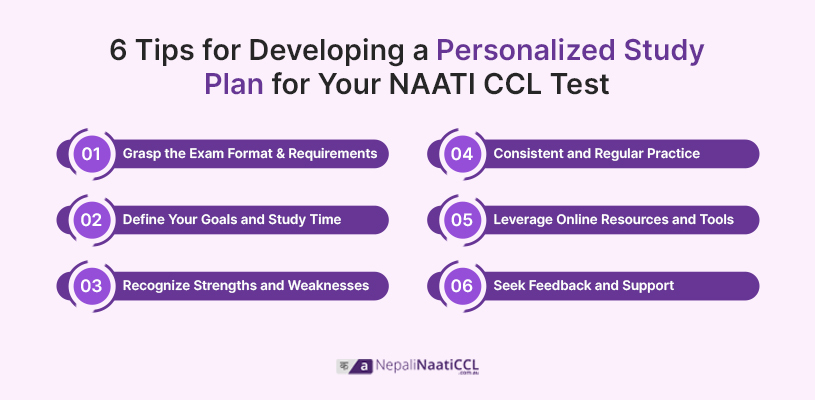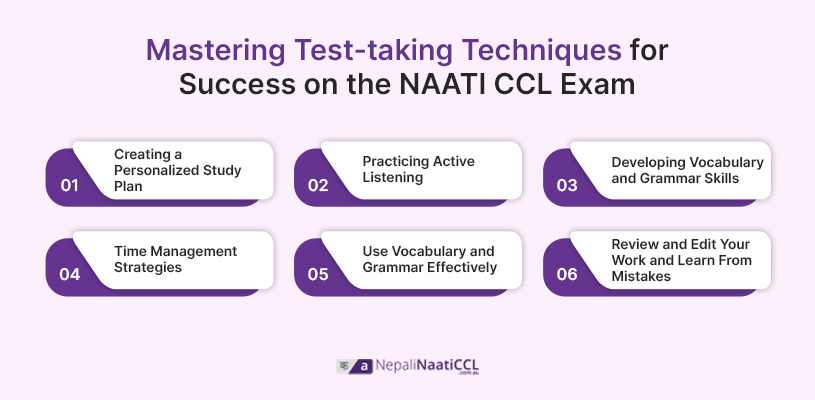The NAATI CCL (Certified Community Language) exam holds a significant role for individuals aspiring to secure five essential Australian PR points. If you’re on the lookout for insights on constructing a tailored study plan for your NAATI CCL exam, you’ve landed in the perfect spot.
So, what’s NAATI CCL all about? It’s a special certification given to people who can deliver in both English and another language (LOTE). Plus, if your interest persists, you can explore exciting job opportunities in Australia, particularly in fields like interpreting and translating.
Now, let’s talk strategy. Developing a personalized study plan for your NAATI CCL test is crucial if you want to clear the test on your first attempt. It’s the roadmap to your success.
But why is this so crucial? Well, a personalized plan considers your strengths, weaknesses, and the unique way you learn. Hence, this blog post will be your guide that offers a step-by-step manual to help you in developing a personalized study plan for your NAATI CCL test, which perfectly aligns with your NAATI CCL exam goals.
Setting Realistic Expectations for the NAATI CCL Exam
When it comes to getting ready for the NAATI CCL exam, having realistic expectations is a game-changer. Starting, you need to know how much time and effort it takes to prep for the exam and clear it on your first attempt.
Also, understanding the format and requirements of the exam is a smart move. It gives you a sense of how good you need to be. Plus, you’ve got to plan your study time wisely – figure out how much time you can put in each day or week.
Likewise, let’s talk about test anxiety. It’s normal, and you can handle it. There are tricks to stay relaxed and focused during the exam.
Now, here’s the thing – getting the NAATI CCL test certification on your first try might feel like a challenging goal. But here’s a secret: treat it as a chance to learn.
Think of it as a stepping stone. This mindset builds your confidence and character, making you more robust for the next attempt.
So, when you set realistic expectations, you’re not just getting ready for the exam but gearing up for success. Get set for a journey where you not only learn but also conquer!
Similarly, each aspect of your study plan, from understanding the exam format to managing test anxiety, contributes to exam success and overall development.
Hence, developing a personalized study plan for your NAATI CCL test will help you embrace test challenges as a chance to enhance your language proficiency, time management skills, and resilience – qualities that extend beyond the exam room.
6 Tips for Developing a Personalized Study Plan for Your NAATI CCL Test

When aiming for NAATI CCL certification, creating a personalized study plan is a crucial step. Also, it doesn’t matter if you’re gearing up for your first attempt or a retake; the following tips can steer you toward achieving your certification goals and gaining those 5 Australian PR points.
1. Grasp the Exam Format and Requirements
Understanding the format and requirements of the test is fundamental for success. To begin, familiarize yourself with the structure of the NAATI CCL exam.
This examination comprises two dialogues you must interpret consecutively, translating between English and your chosen language. Moving forward, grasp the time aspect.
The test spans approximately 30 minutes, during which you must showcase your language proficiency. Therefore, to pass, you must secure a minimum of 63 marks out of 90.
Furthermore, you should understand the intricacies of conveying meaning accurately from one language to another. Recognize that your ability to navigate between English and your chosen language seamlessly is a pivotal aspect of the evaluation process.
Considering these factors, it is crucial to set realistic expectations for yourself. Acknowledge the effort and dedication required for effective preparation. By comprehending the NAATI CCL test’s format and requirements and learning about the assessment criteria for the NAATI CCL test, you lay the groundwork for a strategic and targeted study plan, aligning your efforts with the specific demands of the NAATI CCL test.
2. Define Your Goals and Study Time
Clarifying your goals and establishing a structured study timetable are pivotal steps in preparing for the NAATI CCL exam. First and foremost, you should clearly outline what you aim to achieve in the exam.
Set realistic and measurable goals aligning with your proficiency level in English and your target language.
Once your goals are defined, the next step is to allocate dedicated study time. Consider your current language proficiency and the time remaining until the exam date. Be pragmatic in setting aside sufficient time for consistent and focused study sessions.
Moreover, be mindful of the specificity of your goals. Whether improving vocabulary, enhancing interpreting skills, or refining grammar, tailor your study plan to address these objectives.
Similarly, setting realistic study timeframes is equally crucial. Avoid overburdening yourself with excessive study hours that may lead to burnout. Instead, find a balance that suits your schedule and allows effective learning.
Consistency in study sessions, coupled with clear goal-setting, enhances your readiness for success in the NAATI CCL exam.
3. Recognize Strengths and Weaknesses
Acknowledging your strengths and identifying areas for improvement is a crucial aspect of tailoring your preparation for the NAATI CCL online test. This self-evaluation helps you recognize where you shine and where there’s room for enhancement.
One effective approach is to engage in mock tests or practice exams. These assessments provide a practical gauge of your abilities and highlight specific areas requiring more attention.
Also, take note of your performance in interpreting dialogues, paying attention to nuances such as pronunciation, fluency, and vocabulary usage.
Upon identifying your strengths and weaknesses, strategize your study plan accordingly. Channel your efforts into reinforcing your strong points while dedicating extra time to areas that need improvement. For instance, if vocabulary is a strength, focus on refining your interpreting skills or addressing grammar intricacies.
Furthermore, consider seeking external feedback. Language partners, tutors, or study groups can provide valuable insights. Their perspectives offer an external lens, helping you identify nuances you might overlook. We will discuss this briefly in a later section.
4. Consistent and Regular Practice
Engaging in consistent and regular practice is a cornerstone of effective preparation for the NAATI CCL exam. For this, consistency is vital, as it fosters a continuous and gradual improvement in your language proficiency.
Also, regular practice can take various forms. Consider partnering with a language study group, participating in online courses, or practicing with a language partner.
These interactions provide diverse perspectives, exposing you to different accents, expressions, and language nuances. Such exposure contributes to a well-rounded linguistic skill set.
Moreover, consistency in practice sessions instills a sense of discipline and routine. Treat language practice as a daily habit, integrating it seamlessly into your schedule. This approach ensures that you hone your language skills consistently, reducing the likelihood of gaps or lapses in your preparation.
Recognizing that improvement comes with repetition and sustained effort is also essential. Regular practice sessions contribute to muscle memory, enhancing your ability to interpret dialogues fluently and accurately.
Hence, you must embrace a mindset of continuous learning, where each practice session builds upon the foundation of the previous one. By making language practice a consistent element of your routine, you cultivate a dynamic and evolving proficiency that positions you strongly for the challenges of the exam and beyond.
5. Leverage Online Resources and Tools
Taking advantage of online resources and tools is a smart strategy in your NAATI CCL exam preparation. In this digital age, a wealth of materials is available at your fingertips, enhancing your learning experience. Let’s explore how to leverage these resources effectively.
Firstly, consider supplementing your study materials with online resources. Platforms like CCLHUB and NepaliNAATICCL offer a diverse range of NAATI CCL study materials, practice tests, and other valuable resources.
These materials may include videos, audio recordings, and additional practice tests that provide a dynamic and interactive learning experience.
Moreover, explore online courses that cater specifically to the NAATI CCL exam. These courses often offer structured modules, providing a systematic approach to covering the exam’s requirements. Video lessons and interactive exercises can bring the learning content to life, making it more engaging and accessible.
Podcasts and audio materials in your target language are additional online tools to incorporate into your study plan. Listening to native speakers enhances your auditory comprehension and exposes you to various accents and language nuances.
Additionally, online practice tests mimic the exam conditions, offering a valuable simulation of the real thing. Mock tests help you familiarize yourself with the format, track your progress, and avoid common mistakes for the NAATI CCL test.
6. Seek Feedback and Support
Actively seeking feedback and support is a pivotal aspect of gearing up for success in the NAATI CCL exam. I suggest you connect with a language partner or tutor or join a study group.
Likewise, these interactions offer a platform to receive constructive feedback on various aspects of your language skills, such as pronunciation, intonation, and grammar. The external perspective others provide can pinpoint areas for improvement and help refine your overall proficiency.
Moreover, venturing into online forums and discussion groups dedicated to NAATI CCL exam preparation is another effective avenue for seeking support. Engaging with peers allows you to share experiences, exchange tips, and address challenges collectively.
If resources permit, consider enrolling in courses that offer personalized feedback from experienced instructors. This tailored guidance ensures a more targeted approach to honing your language proficiency, providing insights and recommendations that align with the specific requirements of the NAATI CCL exam.
Hence, seeking feedback and support is a proactive and strategic move in your NAATI CCL exam preparation. It builds a network of encouragement, constructive critique, and shared experiences that collectively contribute to a more robust and well-rounded readiness for the challenges ahead.
✅ Also check out: NAATI CCL Tips for Last-Minute Preparation.
Mastering Test-taking Techniques for Success on the NAATI CCL Exam

To earn valuable Australian PR points and to ensure your success, it’s vital to master effective NAATI CCL test-taking techniques. Our guide is designed to provide you with valuable insights and strategies to approach the NAATI CCL exam confidently.
Also, the following section will explore six key strategies for mastering test-taking techniques and achieving success on the NAATI CCL exam.
1. Creating a Personalized Study Plan
Develop a personalized study plan that fits your learning style and schedule. Your study plan should include strategies for practicing each type of task and time for review and improvement.
Furthermore, In your study plan, balance listening and speaking practice. Dedicate specific time slots to engage with audio materials in your target languages actively. This improves your comprehension skills and sharpens your ability to respond promptly.
Concurrently, allocate time for regular speaking practice. Engage in conversations, record yourself, and evaluate your performance. This active approach enhances your linguistic fluency and boosts your confidence in expressing ideas effectively.
As you progress, periodically review and adjust your study plan. Track your accomplishments and address any challenges that may arise. Be flexible in adapting your strategies based on your evolving needs.
2. Practicing Active Listening
In the interpreting task, practice active listening by paying close attention to the speaker’s tone, word choice, and main points. NAATI CCL test can be difficult if you refrain from practicing active listening.
Also, during your active listening practice, mimic the pace and intonation of native speakers. This improves your ability to follow conversations and enhances your speaking skills.
Another effective strategy is conversing with native speakers or language partners. This provides a real-world context for your listening skills and exposes you to various speaking styles.
To further boost your active listening skills, consider using technology. Explore language learning apps that offer audio exercises or interactive listening activities.
Incorporate these strategies into your study routine, and you’ll not only enhance your listening skills but also elevate your overall performance in the NAATI CCL test.
3. Developing Vocabulary and Grammar Skills
In the translation task, focus on developing your vocabulary and grammar skills to translate the text accurately and fluently. Use resources such as NAATI CCL course materials and practice tests to improve these skills.
In parallel, emphasize grammar practice. Work through exercises that target common grammatical structures and sentence formations in both languages. Online resources, language learning apps, or grammar workbooks can provide structured exercises.
Consistent practice helps solidify your grasp of the rules and patterns.
Moreover, apply your vocabulary and grammar skills actively. Engage in written exercises, such as composing short paragraphs or essays in your study languages. This hands-on practice reinforces your ability to express ideas coherently and accurately.
4. Time Management Strategies
Develop time management strategies to help you use your time effectively during the exam. Use your study plan to practice allocating time for each task and leaving time for review and improvement.
Similarly, prioritize your tasks based on their importance and your proficiency levels. Focus on strengthening weaker areas while maintaining practice in your strong suits. This targeted approach maximizes the effectiveness of your study sessions and boosts overall readiness.
Set specific goals for each study session. Whether it’s completing a certain number of practice exercises, reviewing vocabulary, or simulating a mock test, having clear objectives keeps you on track and motivated.
Likewise, embrace the Pomodoro Technique or similar time management methods. Break your study time into intervals, typically 25 minutes of focused work and a 5-minute break. This helps maintain concentration and prevents burnout.
After completing a set of intervals, take a longer break to recharge.
5. Use Vocabulary and Grammar Effectively
In the translation task, focus on using vocabulary and grammar accurately and appropriately. Use your study plan to identify areas where you need improvement and practice accordingly.
Pay close attention to grammatical structures, ensuring your sentences are well-constructed—also, practice using different sentence types, such as simple, compound, and complex sentences. This variety showcases your grammatical prowess and adds richness to your language expression.
In written exercises, proofread your work meticulously. Check for grammatical errors, spelling mistakes, and proper punctuation. A clean and polished piece of writing reflects a strong command of language and enhances your overall performance in the NAATI CCL test.
6. Review and Edit Your Work and Learn From Mistakes
After completing each task, review and edit your work for a few minutes. Check for spelling and grammar errors, as well as clarity and coherence. Use your study plan to practice reviewing and editing your work regularly.
Moreover, use your mistakes as opportunities for learning and improvement. After completing practice tests or receiving feedback, analyze your mistakes and identify areas where you need improvement.
Creating a Support Network for your NAATI CCL Preparation
Prepping for the NAATI CCL exam is a challenging feat, and tackling it solo can be overwhelming. Building a support network is a savvy move to keep your motivation high, maintain focus, and stick to your study plan.
Furthermore, to create a support network for your NAATI CCL preparation, enlist the help of family, friends, or classmates who are also gearing up for the exam. They serve as excellent motivators and collaborative efforts can involve practicing interpreting skills or quizzing each other on exam content.
On top of that, consider joining online communities or forums to expand your support network. Connecting with fellow exam preppers on these platforms allows you to ask questions, share experiences, and gain insights from others in the same boat.
Your support network becomes a valuable resource, offering study materials, practice exams, and emotional support to navigate the challenges of your preparation journey and clear the NAATI CCL test on your first attempt.
Conclusion
The journey toward achieving the NAATI CCL certification can be a challenging one. However, implementing the strategies outlined in this article can create a roadmap to help in developing a personalized study plan for your NAATI CCL exam.
Finally, remember that resources are available to help you on your journey. CCLHUB, for instance, provides NAATI CCL course materials, NAATI CCL mock tests, and free NAATI CCL test samples that significantly impact your learning. By utilizing these resources and taking advantage of the opportunities available, you can improve your chances of success on the exam.
Also, achieving the NAATI CCL certification is a significant accomplishment that can open a pathway to earning those valuable Australian PR points. Hence, developing a personalized study plan for your NAATI CCL test is very vital.
Happy Learning!
FAQ
Q.1: Why is it crucial to have a personalized study plan for the NAATI CCL exam?
A plan tailored to your strengths and weaknesses ensures efficient and effective preparation, boosting your chances of success.
Q.2: What are the first steps in creating a personalized study plan for the NAATI CCL exam?
Start by assessing your language skills, identifying areas for improvement, and setting realistic goals for each study session.
Q.3: How can study materials like mock tests contribute to a personalized study plan?
Mock tests simulate real exam conditions, helping you adapt and boosting your confidence. They’re a valuable tool in refining your personalized plan.
Q.4 How does balancing listening and speaking practice enhance a personalized study plan?
Balancing both skills ensures a well-rounded language proficiency. It sharpens your ability to understand and express ideas effectively during the NAATI CCL exam.
Q.5: Why is periodically reviewing and adjusting your personalized study plan important?
Regular reviews help track progress, identify challenges, and adapt the plan to evolving needs. This flexibility ensures continuous improvement in your NAATI CCL exam readiness.








